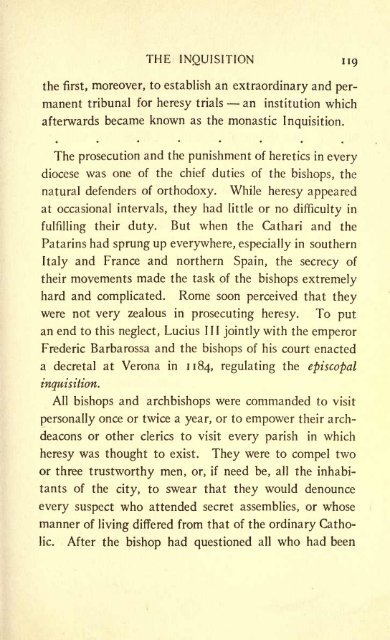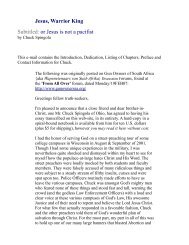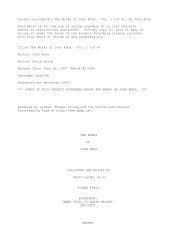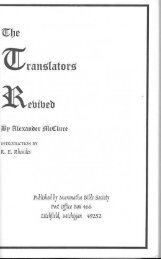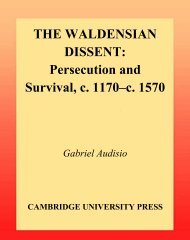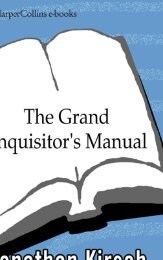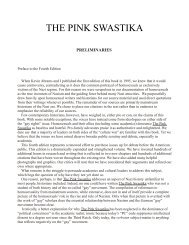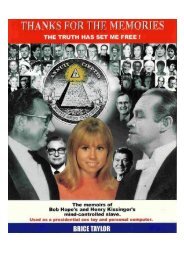- Page 7 and 8:
THE INQUISITION
- Page 9 and 10:
THE INQUISITION A CRITICAL AND HIST
- Page 11 and 12:
PREFACE THERE are very few Catholic
- Page 13 and 14:
PREFACE vii press, and has been tra
- Page 15 and 16:
PREFACE ix pression of heresy, from
- Page 17 and 18:
PREFACE CONTENTS CHAPTER I : FIRST
- Page 19 and 20:
CONTENTS xiii CHAPTER VI FIFTH PERI
- Page 21 and 22:
THE INQUISITION CHAPTER I FIRST PER
- Page 23 and 24:
THE INQUISITION 3 most bitterly aga
- Page 25 and 26:
THE INQUISITION 5 (the persecutors)
- Page 27 and 28:
THE INQUISITION 7 This protest is t
- Page 29 and 30:
THE INQUISITION 9 From the reign of
- Page 31 and 32:
THE INQUISITION 287: "We thus
- Page 33 and 34:
THE INQUISITION 13 verts from the s
- Page 35 and 36:
THE INQUISITION 15 Did not Christ f
- Page 37 and 38:
THE INQUISITION 17 punishment is no
- Page 39 and 40:
THE INQUISITION 19 St. Augustine at
- Page 41 and 42:
THE INQUISITION faith who would nev
- Page 43 and 44:
THE INQUISITION 23 suffer to live.&
- Page 45 and 46:
THE INQUISITION 25 This deplorable
- Page 47 and 48:
THE INQUISITION 27 ists in the fift
- Page 49 and 50:
THE INQUISITION 29 demnation of Pri
- Page 51 and 52:
CHAPTER III THIRD PERIOD. FROM 1 1
- Page 53 and 54:
THE INQUISITION 33 tical origin. Th
- Page 55 and 56:
THE INQUISITION we possess go to sh
- Page 57 and 58:
THE INQUISITION 37 Few details have
- Page 59 and 60:
THE INQUISITION 39 flames. This ang
- Page 61 and 62:
THE INQUISITION 41 Strangely enough
- Page 63 and 64:
THE INQUISITION 43 protested in wor
- Page 65 and 66:
THE INQUISITION 45 to state his vie
- Page 67 and 68:
THE INQUISITION 47 an answer to St.
- Page 69 and 70:
THE INQUISITION 49 mental character
- Page 71 and 72:
THE INQUISITION 51 In Germany and F
- Page 73 and 74:
THE INQUISITION 53 property of some
- Page 75 and 76:
THE INQUISITION 55 Simon de Montfor
- Page 77 and 78:
THE INQUISITION 57 inflict upon the
- Page 79 and 80:
THE INQUISITION 59 At this time the
- Page 81 and 82:
THE INQUISITION entailed. "The
- Page 83 and 84:
the death-penalty for heresy. THE I
- Page 85 and 86:
Council of I2I5. 1 THE INQUISITION
- Page 87 and 88: THE INQUISITION 67 than that of the
- Page 89 and 90: CHAPTER V THE CATHARAN OR ALBIGENSI
- Page 91 and 92: ing. THE INQUISITION 71 Bonacursus,
- Page 93 and 94: THE INQUISITION 73 Catharism was ch
- Page 95 and 96: THE INQUISITION 75 of God." 1
- Page 97 and 98: THE INQUISITION 77 of the saints we
- Page 99 and 100: THE INQUISITION 79 Some of the Cath
- Page 101 and 102: THE INQUISITION the liturgical pray
- Page 103 and 104: THE INQUISITION 83 Those who died w
- Page 105 and 106: THE INQUISITION 85 the Son and the
- Page 107 and 108: THE INQUISITION 87 of the candidate
- Page 109 and 110: THE INQUISITION 89 speaks of the on
- Page 111 and 112: THE INQUISITION There was nothing v
- Page 113 and 114: THE INQUISITION 93 said: "Whos
- Page 115 and 116: tution." * THE INQUISITION 95
- Page 117 and 118: THE INQUISITION 97 slept with their
- Page 119 and 120: THE INQUISITION 99 did not ask for
- Page 121 and 122: THE INQUISITION forate her intestin
- Page 123 and 124: THE INQUISITION 103 endura, and its
- Page 125 and 126: CHAPTER VI FIFTH PERIOD GREGORY IX
- Page 127 and 128: others"; the bishop is to prov
- Page 129 and 130: THE INQUISITION 109 law throughout
- Page 131 and 132: THE INQUISITION Gaula maintained th
- Page 133 and 134: THE INQUISITION 113 penance. 1 This
- Page 135 and 136: THE INQUISITION 115 torn of burning
- Page 137: THE INQUISITION 117 of Rome and the
- Page 141 and 142: THE INQUISITION The Popes, as the r
- Page 143 and 144: THE INQUISITION 123 It is probable
- Page 145 and 146: THE INQUISITION 125 only a slight s
- Page 147 and 148: THE INQUISITION 127 This is readily
- Page 149 and 150: THE INQUISITION 129 After the priso
- Page 151 and 152: THE INQUISITION 131 However, the la
- Page 153 and 154: THE INQUISITION 133 This Pope was,
- Page 155 and 156: THE INQUISITION 135 which he establ
- Page 157 and 158: THE INQUISITION 137 papal commissio
- Page 159 and 160: THE INQUISITION 139 deliberate with
- Page 161 and 162: concerned. 1 THE INQUISITION 141 Th
- Page 163 and 164: THE INQUISITION 143 that the Bishop
- Page 165 and 166: THE INQUISITION 145 liable to excom
- Page 167 and 168: THE INQUISITION 147 A little later,
- Page 169 and 170: THE INQUISITION 149 if these could
- Page 171 and 172: THE INQUISITION 151 by classing her
- Page 173 and 174: THE INQUISITION 153 was stretched a
- Page 175 and 176: THE INQUISITION 155 uals of the Inq
- Page 177 and 178: THE INQUISITION 157 Besides, the in
- Page 179 and 180: CHAPTER VIII THEOLOGIANS, CANONISTS
- Page 181 and 182: THE INQUISITION But by degrees the
- Page 183 and 184: THE INQUISITION 163 Superstition wa
- Page 185 and 186: THE INQUISITION 165 and Herodias we
- Page 187 and 188: THE INQUISITION 167 The Inquisitori
- Page 189 and 190:
THE INQUISITION of course gave full
- Page 191 and 192:
THE INQUISITION doubtedly completed
- Page 193 and 194:
THE INQUISITION 173 church from the
- Page 195 and 196:
THE INQUISITION 175 1 debita began
- Page 197 and 198:
THE INQUISITION 177 and they shall
- Page 199 and 200:
THE INQUISITION 179 the civil judge
- Page 201 and 202:
THE INQUISITION pretty well the cur
- Page 203 and 204:
THE INQUISITION 183 Bohemia in the
- Page 205 and 206:
THE INQUISITION 185 Other acts of t
- Page 207 and 208:
THE INQUISITION these tortures were
- Page 209 and 210:
THE INQUISITION It would be easy to
- Page 211 and 212:
THE INQUISITION 191 in the fourteen
- Page 213 and 214:
THE INQUISITION 193 We have, for in
- Page 215 and 216:
THE INQUISITION 195 cross. Twenty,
- Page 217 and 218:
THE INQUISITION 197 We notice at Pa
- Page 219 and 220:
THE INQUISITION dren. Five hundred
- Page 221 and 222:
THE INQUISITION ence upon the canon
- Page 223 and 224:
THE INQUISITION 203 case of all obd
- Page 225 and 226:
THE INQUISITION 205 little security
- Page 227 and 228:
THE INQUISITION 207 We have seen, m
- Page 229 and 230:
tine, and many others, 1 THE INQUIS
- Page 231 and 232:
THE INQUISITION 211 heretics rebell
- Page 233 and 234:
THE INQUISITION 213 that usually ac
- Page 235 and 236:
THE INQUISITION 215 to keep intact
- Page 237 and 238:
THE INQUISITION 217 call in questio
- Page 239 and 240:
THE INQUISITION 219 " If thy b
- Page 241 and 242:
suppressed. THE INQUISITION 221 In
- Page 243 and 244:
THE INQUISITION 223 I merely put to
- Page 245 and 246:
THE INQUISITION 225 Such severity,
- Page 247 and 248:
THE INQUISITION 227 hope of gain, o
- Page 249 and 250:
THE INQUISITION 229 copy of the cap
- Page 251 and 252:
THE INQUISITION 231 examined in det
- Page 253 and 254:
THE INQUISITION 233 himself guilty
- Page 255 and 256:
historians, that they quisition dea
- Page 257 and 258:
THE INQUISITION 237 they were fully
- Page 259 and 260:
THE INQUISITION 239 Advocates of th
- Page 261 and 262:
typical instance in which history T
- Page 263 and 264:
THE INQUISITION 243 It is therefore
- Page 265 and 266:
THE INQUISITION 245 The penalty of
- Page 267 and 268:
THE INQUISITION 247 It is certain t
- Page 269 and 270:
THE INQUISITION 249 in the beginnin
- Page 271 and 272:
silence significant? THE INQUISITIO
- Page 273 and 274:
THE INQUISITION 253 ments are favor
- Page 275 and 276:
pendently of the prisoner, THE INQU
- Page 277 and 278:
THE INQUISITION 257 fact, she exerc
- Page 279 and 280:
APPENDIX 259 et Villemuriensi archd
- Page 281 and 282:
APPENDIX 261 Formula intenogatorii
- Page 283 and 284:
APPENDIX 263 dilationis sive termin
- Page 285 and 286:
APPENDIX 265 receperint aut defende
- Page 287 and 288:
APPENDIX 267 excommunicationis vinc
- Page 289 and 290:
APPENDIX 269 Plura quidem alia faci
- Page 291 and 292:
BIBLIOGRAPHY THIS volume does not c
- Page 293 and 294:
BIBLIOGRAPHY 273 Doctrina de modo p
- Page 295:
BIBLIOGRAPHY 275 des XIV en Jahrhun
- Page 298 and 299:
2 7 8 INDEX Bernard, St., opposes H
- Page 300 and 301:
Henry VIII (England), 221. Henry of
- Page 302 and 303:
282 INDEX Oath, use of, denounced b
- Page 304 and 305:
284 INDEX Witnesses, age of, 260. d
- Page 306 and 307:
LONGMANS, GREEN, 6- CO S PUBLICATIO
- Page 308 and 309:
LONGMANS, GREEN, & CO S PUBLICATION
- Page 312:
11 301


